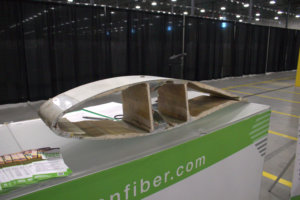After over a year in the making, REGEN Fiber’s new Fairfax recycling facility saw its grand opening this Wednesday, June 5.
Owned by Travero, which is a subsidiary of Alliant Energy Corporation, REGEN Fiber announced last year that it would launch a new initiative to recycle wind turbine blades. The process converts decommissioned blades, primarily made from fiberglass and plastics, into a reusable powder for mixtures like concrete, mortar, and asphalt.
The grand opening featured multiple stations within Travero’s main logistics warehouse with staff who discussed REGEN’s core values: environmentalism, innovation, economic growth, and durability.

At the environmentalism station, attendees could observe a portion of a smaller decommissioned turbine blade and learn about how REGEN aims to promote sustainability. Travero Operations Manager Alyson Mullin said REGEN’s process is much less impactful on the environment as opposed to current methods.
“Right now, these wind blades get compacted and get put into landfills, or they get burned and compressed,” Ms. Mullin said. “So our process is 100% mechanical, so there’s no heat, no chemicals to use.”
The innovation station had jars of material representing each stage of the recycling process, from larger pieces — dubbed “field shred” — to a fiberglass powder that indicated what the final recycled component could look like. Jeff Woods, Travero’s director of business operations, emphasized the variability of the patent-pending recycling process.
“When it comes out, we have the ability to make different sizes of fibers,” Mr. Woods said. “So you end up with a litany of sizes, which is good because what we found in testing of the product itself, not having a uniform size fiber is actually beneficial in terms of its ability to reinforce the concrete itself or asphalt.”
Alliant Energy President & CEO Lisa Barton, Travero CEO Lisha Coffey, and Fairfax Mayor Jo Ann Beer briefly spoke at the event, welcoming attendees and discussing the local impact of REGEN.
“Wind energy is the cornerstone of Alliant Energy’s diverse energy mix,” Ms. Barton said. “By integrating these recycled materials into construction projects in the energy industry, we are contributing to a circular economy. The start of production of REGEN fiber underscores our commitment to this community.”
The recycling process
Attendees then took a shuttle to tour the REGEN Fiber processing facility, located further within the logistics park. The machinery resides in one of two 36,000-square-foot buildings, with the other used for storage.
Though the machinery itself was not operational, Travero’s Senior Manager of Manufacturing Operations Jake Nickel gave a tour of the facility. Mr. Nickel explained that the production line consists of a series of mills, sorting machines, conveyor belts, and collection bags.
He said the process begins with the acquired wind turbine remains, which are already shredded for easier transport when REGEN receives them. They are first fed via a conveyor belt into a ring mill, which grinds down the material further before it gets sorted by size in a shaker bed. The process repeats until the smallest materials are all gathered in collection bags and transported to storage.
Mr. Nickel said the largest fibers within the final product are only around half the length and width of a toothpick. From there, the recycled material is sold to various manufacturers to be used in enhanced durable construction, soil stabilization, and more.
Though some parts of the machinery are still under construction, Mr. Nickel said his team has tested and run each part of the production line separately. REGEN has the capacity to process 12 tons of shredded turbine blades per hour, with each blade originally weighing anywhere from 3-10 tons.
Though there is not a set date for when the production line will officially operate, Mr. Nickel estimated it would be very soon.